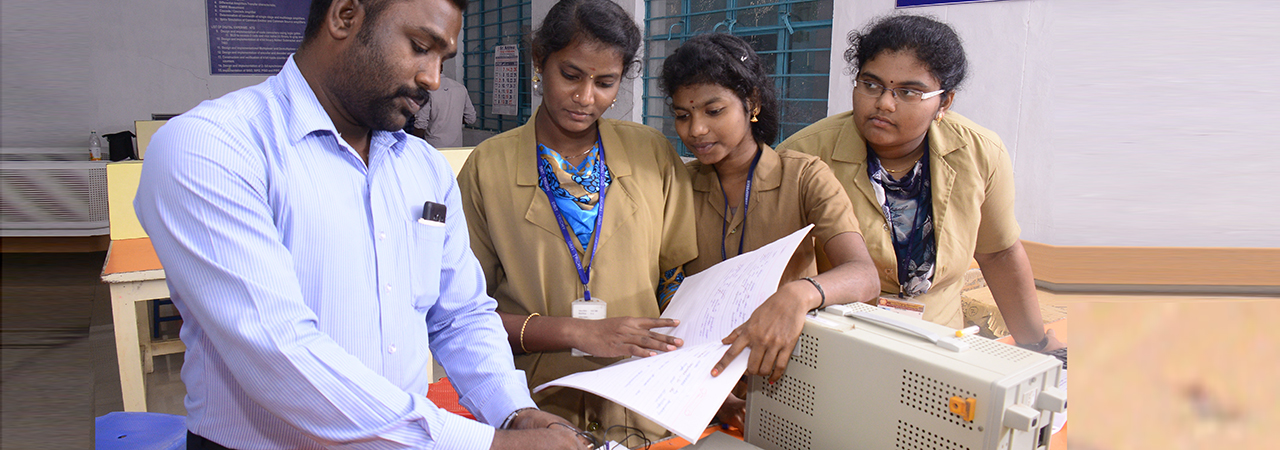About the Department

In this Information era, the range of communication tools and devices are numerous starting from telephone modes to satellites, computers and internet video streaming, to name but a few. Without the advancement in electronics, these would not have been possible. All above, put in the picture the basic importance of the discipline.
The obtainability of affordable means of communication has been one of electronics’ greatest contributions to human society.
- The telephone, radio, satellite communications, the internet, mobile phones and such development has modernized the way we live and the way we think about our world.
- New technologies continuously emerge, with 4G mobile phones offering the possibility of real-time high quality video.
- DSL and broadband wireless systems provide many times the capacity of modems bringing increased amounts of information into our homes.
- Other advancements include Fiber optics, wavelength-division multiplexing schemes and its promising vast reductions in the cost of long-distance data transmission.
- Communication Lab
- Digital Lab
- Computer center with DSP Unit, Networking software.
- Electronics Circuits and Simulation Lab
- LIC Lab
- Microprocessor and Micro controller Lab
- VLSI Lab
- Department Library
- PEO1: PREPARATION To acquire strong knowledge in mathematics, science, engineering fundamentals and ability to use the tools in Electronics and Communication Engineering.
- PEO2: CORE COMPETENCE To develop the ability to demonstrate technical competence in the fields of electronics and communication engineering and develop solutions to the problems in various areas in Electronics and communication Engineering.
- PEO3: LIFELONG LEARNING AND VIRTUES Creating an excellent academic learning environment by providing awareness on lifelong learning and guidelines needed for successful professional career.
- PEO4: RESEARCH AND DEVELOPMENT To provide stimulating research environment to the faculty and students so that they feel motivated for higher studies and innovation in the specific and allied domains of electronics and communication engineering.
- PEO 5: TEAM WORK AND LEADERSHIP Flexibility to execute team work without any disparity based on gender, knowledge, social, work environmental and economic considerations.
- PO1: Engineering Knowledge Applybasic scienceand mathematicstoanalyzecomplexEngineeringProblems
- PO2: Problemanalysis Identify,formulate,review resear chliterature,andanalyze complex engineering Problems reaching substantiated conclusions using first principles of mathematics,natural sciences,and engineering sciences.
- PO3: Design/development ofsolutions Gatherrequirementspecifications,design and test system for environmental issues.
- PO4: Conduct investigationsof complexproblems Workinateamusingtechnicalskills,commontools andenvironmentsto achieveprojectobjective
- PO5: Moderntoolusage ApplyEDAtoolsto design linearand digitalICsystems.
- PO6: The engineer and society Pursuelife-longlearningasa means ofenhancing knowledge and skillsforcontinuous professionaladvancement.
- PO7: Environment and sustainability Understand the impact of the professionalengineeringsolutions in societal and environmental contexts, and demonstrate theknowledgeof,andneed forsustainabledevelopment
- PO8: Ethics Apply ethical principles and commit to professional ethics and responsibilitiesandnormsoftheengineeringpractice.
- PO9: Individual and Team work Function effectively as an individual and as a member or leader in diverse teams, and in multi-disciplinary settings.
- PO10: Communication Communicate effectively with Peers and others.
- PO11:Project Management and Finance Understand how the organizations works, develop optimal models, generate wealth and manage their finances.
- PO12: Life Long Learning Recognize the need for preparation and ability to engage in independent and lifelong learning in the broadest context of technological changes.
- PS01:EngineeringKnowledge&Analysis TheabilitytoabsorbandapplyFundamentalknowledge ofcoreElectronicsandCommunicationengineering subjectsIntheanalysis,design,anddevelopment of various types of integratedelectronic systems
- PSO2:System Design Competenceinusing electronicmodernITtools(bothsoftwareandhardware) forthe design and analysisofcomplex electronic systems in furtherance toresearch activities.
- PSO3:Applicationof the knowledgeonsociety/Environment Apply thecontextualknowledgeof ElectronicsandCommunicationEngineering toassess,social, environmental,health,safety,legal issues with professionalethicsand actasa leader to managedifferentprojects in multidisciplinary environment
All these developments have been powered by advances in communications technology. Constantly emerging new protocols and coding schemes, new ways to represent video, images and speech as data, new means of delivering this information to users via cable, fibre, and increasingly via radio. These developments are, in turn, based on sound engineering principles.
Scope and Future Prospects
First year of Electronics and Communication Engineering course dedicated to teach students about basic engineering techniques such as engineering mathematics, physics, chemistry and engineering drawing to name few. From second year of studies student start to learn about core Electronics and communication engineering subjects like digital electronics and logic design, fundamentals of communication engineering, electronic circuits, signals and systems, Electrical engineering and instrumentation, applied electromagnetic theory, integrated circuits, VLSI Design, control systems and computer architecture are just few to mention.
Electronics and Communication Engineering course give enormous job opportunities in electronics and software companies. All electronic devices need software interface to run and come with one other or other device controlling programs architected and developed by electronics and communication engineering. It also gives great opportunities for research and development, as everyday consumer need new devices to support them in daily life.
Core companies offering jobs to Electronics and Communication Engineers
Bharat Electronics Limited (BEL), Electronics Corporation of India Limited (ECIL), Intel, Samsung Electronics, Sony, Toshiba, Philips Semiconductors, Texas Instruments, LG Electronics, Nokia, American Megatrends Inc, AMD, CISCO, Nvdia, HP and IBM are just few to mention. Average salary: 3.5~4.5 Lakh INR per annum.
Facilities
Department of Electronics and Communication Engineering is enriched with qualified and experienced faculty members with several years of exposure in Electronics and Communication Engineering and its allied fields. The faculty members are also pursuing research work regularly followed by national and international publications in their credit. The department is equipped with full-fledged state-of-the-art laboratories which cater to the needs of producing highly trained and competent Engineers for the present-day global market.
Department Labs
Programme Educational Objectives (PEOs)
The Program Educational Objectives (PEOs) of the department of ECE are given below




